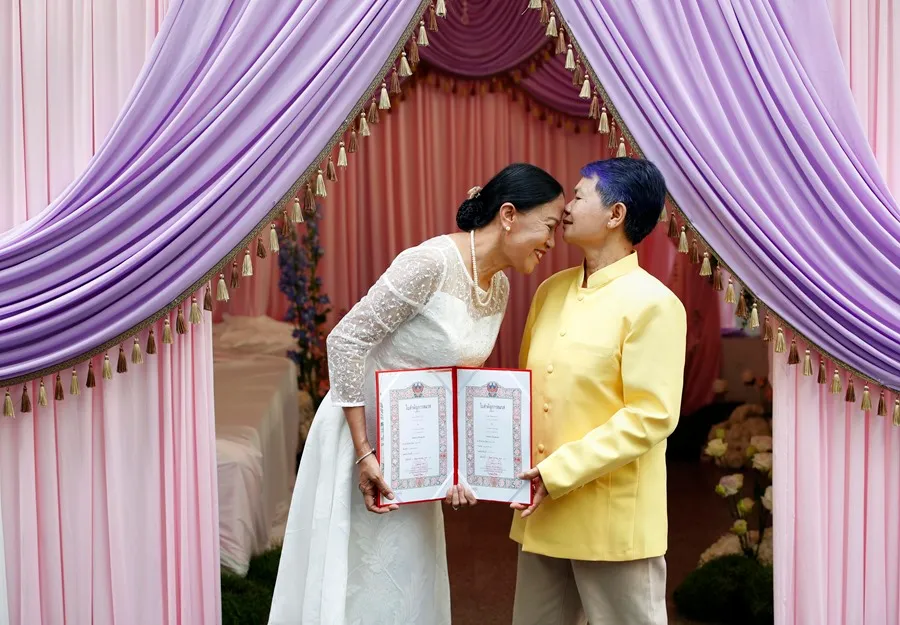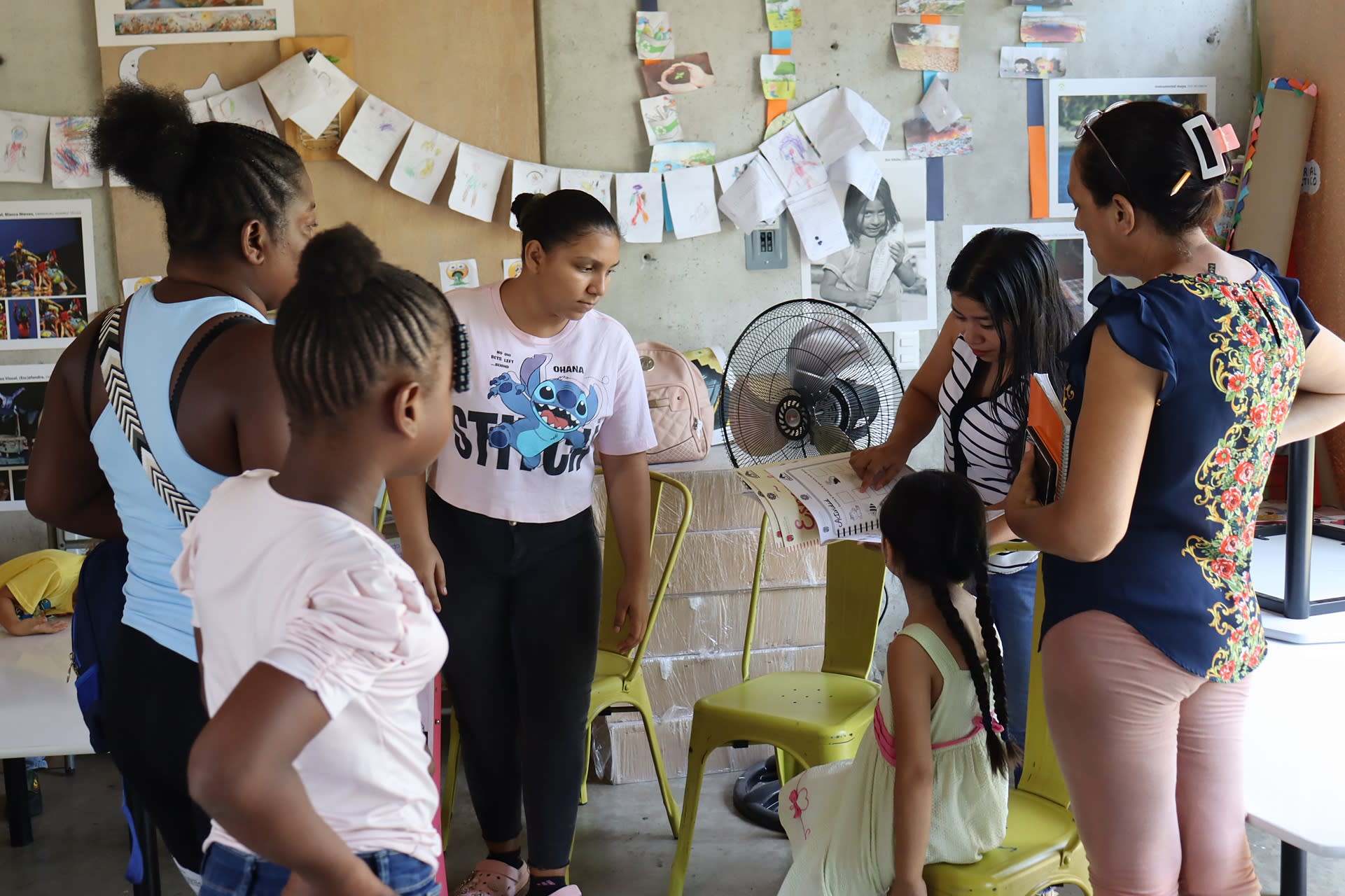International
Equal marriage comes into force in Thailand

Equal marriage came into force this Thursday in Thailand, the first country in Southeast Asia that allows same-sex unions and only the third in Asia to do so, after Nepal and Taiwan, a milestone that will be celebrated today with hundreds of links.
It has taken 120 days since the law was published in the Royal Gazette on September 24, after being approved by Parliament in June, so that it could become effective and begin this Thursday to allow equal marriages in tourist Thailand.
The records will receive today for 10 hours the couples who wish to formalize their links, and the first to do so were the women Ployanapat Jirasukorn, 33, and Kwanporn Kongphet, 32, who sealed their marriage in a ceremony for hundreds of couples convened in the Bangkok Siam Paragon shopping center.
Around 300 couples are expected to be part of that collective wedding today in the Thai capital, a symbol of the step achieved in the Asian country that will accompany a speech by Prime Minister Paetongtarn Shinawatra, while in parallel a multitude of events will be held in provinces throughout the country.
A festive atmosphere to applaud the advances of the LGBTI collective in Thailand, stagnated for years by the two military coups since 2006 that restricted civil liberties, and that now place the country at the head of the entire Southeast Asian region, and most of Asia.
While homosexual couples in Thailand will from today have the same rights as heterosexual ones, including those related to the inheritance and adoption of children, the setbacks are palpable in countries such as Indonesia, Malaysia or Brunei, with a Muslim majority, which criminalize same-sex relationships.
Modern Singapore did not repeal until November 2022 the law that penalizes homosexual sex – section 377A, inheritance of the British colonial period -, in parallel approving a constitutional amendment to shield marriage as an exclusively heterosexual union.
In China, homosexuality has been legal since 1997, although the collective still faces numerous prejudices and challenges. Although India decriminalized in 2018 as Singapore the colonial law that criminalized homosexuality, marriage is only for couples of opposite sex.
Japan, for its part, is the only member of the G7 that does not recognize same-sex marriage, although in recent years its courts and local authorities have taken a series of steps that pave the way for future legalization.
Thailand thus joins the few places in Asia that recognize equal marriage, following Nepal, which legalized it last year, and Taiwan, which was a pioneer in approving it in 2019
Central America
Trump Administration Asks Supreme Court to Block Return of Deported Salvadoran

The Trump administration on Monday asked the U.S. Supreme Court to block a lower court order requiring the return of a Salvadoran migrant who was mistakenly sent to a maximum-security prison in El Salvador, despite having legal protection from deportation.
The U.S. government has until Monday to bring Kilmer Armado Ábrego García back to the United States, as ordered by Judge Paula Xinis in a Maryland court.
According to The Washington Post, the administration argues it lacks authority to comply because Ábrego García is currently in Salvadoran custody.
The U.S. had appealed Judge Xinis’ ruling to the Fourth Circuit Court of Appeals, but the court declined to act immediately—prompting the administration to take the case to the Supreme Court. In its filing, the government stated that “the Constitution entrusts the President, not federal district courts, with the conduct of foreign diplomacy and the protection of the nation from foreign terrorists, including through deportation.”
Ábrego García, a resident of Prince George’s County, Maryland, and married to a U.S. citizen, came under scrutiny in 2019 after an informant claimed he was a member of the MS-13 gang (Mara Salvatrucha).
Although he was initially slated for deportation, a judge later granted him a stay of removal after he requested asylum, according to the lawsuit.
Nevertheless, U.S. Immigration and Customs Enforcement (ICE) detained him on March 12, claiming his status had changed, and sent him to a detention center in Texas.
International
Teachers in Southern Mexico Bring Education to Stranded Migrant Children

Teachers in southern Mexico have created a program to provide classes for migrant children stranded in the region, following a year-over-year increase of over 70% in irregular migration among minors—many of whom lose months or even years of education during their journey toward North America.
In Tapachula, the largest Mexican city bordering Central America, three teachers offer preschool, elementary, and secondary education through the Chiapas State Migrant Education Program (Pemch).
This initiative has been replicated in key municipalities across Chiapas, including San Cristóbal de Las Casas, the capital Tuxtla Gutiérrez, Palenque, Comitán, and other border towns. Currently, there are around 1,345 migrant students and a total of 35 teachers working across farms and shelters.
Pablo Arriaga Velázquez, a teacher with the migrant education program in Tapachula, told EFE that the project was born in response to the large number of migrant minors, as enrolling them in regular schools is often difficult.
Central America
Mulino and Orsi Highlight Shared Vision After Panama Joins Mercosur as Associate State

The Presidents of Panama, José Raúl Mulino, and Uruguay, Yamandú Orsi, highlighted on Monday the path of integration both countries have undertaken in areas such as trade and the defense of democracy, following a meeting held at the Panamanian government headquarters.
In a brief statement to the press, both leaders emphasized that Panama and Uruguay share many values and are working together across different sectors. They also underlined a renewed connection following Panama’s accession last December to the Southern Common Market (Mercosur) as an Associated State.
“Panama has begun a new era of looking southward, seeking opportunities not only for work, business, and friendship, but also for regional integration in a positive sense. Today, I believe we have taken a decisive step in that direction,” said President Mulino.
The Panamanian leader stressed that his country and Uruguay “have much in common” and share “important values in terms of democracy, respect for institutions, and the rule of law—principles that must always be strengthened, no matter how much effort it takes.”
-

 Internacionales2 days ago
Internacionales2 days agoErik Prince Backs Ecuador’s Daniel Noboa in Fight Against Crime and “Narcoterrorism”
-

 Central America4 days ago
Central America4 days agoPanama’s former president Martinelli claims political enemies tried to kill him
-

 Central America2 days ago
Central America2 days agoGuatemala’s Legal Chief Shot Dead in Parking Lot: Investigation Underway
-

 International4 days ago
International4 days agoJavier Milei vows to work ‘side by side’ with the U.S. on trade rules
-

 Central America15 hours ago
Central America15 hours agoHonduras Hosts CELAC Summit Amid Regional Concern Over U.S. Deportations
-

 International15 hours ago
International15 hours agoTeachers in Southern Mexico Bring Education to Stranded Migrant Children
-

 Central America15 hours ago
Central America15 hours agoMulino and Orsi Highlight Shared Vision After Panama Joins Mercosur as Associate State
-

 Central America14 hours ago
Central America14 hours agoTrump Administration Asks Supreme Court to Block Return of Deported Salvadoran















